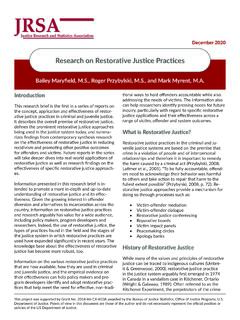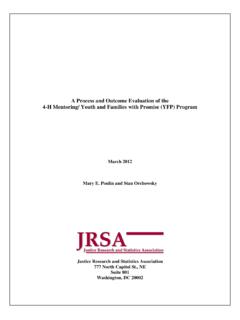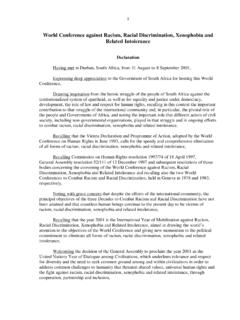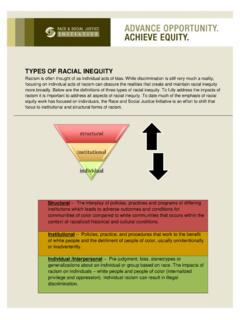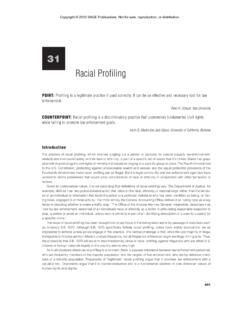Transcription of Implicit Racial Bias - JRSA
1 December 2018. Implicit Racial Bias Bailey Maryfield, Introduction sciously reject racism or other bias may unwittingly act in ways that result in discrimination because of Implicit Implicit Racial bias and its potential effects on criminal bias (Police Executive Research Forum, 2016). justice decision making have become highly visible issues in recent years. Driven by a myriad of factors, The following gives a brief overview of Implicit Racial including the well-documented disparity in criminal bias as it relates to the various stages of the criminal justice involvement across Racial groups and several justice system. Various mechanisms used to address high-profile events that have exposed rifts in the re- Implicit Racial bias are also briefly discussed along with lationships between local police and the communities what is known about their effectiveness.
2 They serve, both discourse and research on the topic of Implicit bias arguably has become more prominent What is Implicit Racial Bias than ever before. This fact sheet is intended to raise awareness about the concept of Implicit Racial bias, the It is important to distinguish Implicit Racial bias effect of Implicit Racial bias in the criminal justice sys- from racism or discrimination . Implicit biases are tem, and how the issue is being addressed to enhance associations made by individuals in the uncon- the fair and equitable administration of justice. scious state of mind. This means that the individ- ual is likely not aware of the biased association. Although Implicit bias can manifest itself in many different forms, such as gender, Racial or religious bias, Implicit Racial bias can cause individuals to un- this fact sheet is focused specifically on Implicit Racial knowingly act in discriminatory ways.
3 This does bias in the context of the criminal justice system. In- not mean that the individual is overtly racist, but deed all human beings have biases or prejudices as a rather that their perceptions have been shaped result of their experiences, and these biases influence by experiences and these perceptions potentially how they might react when dealing with unfamiliar result in biased thoughts or actions. people or situations (President's Task Force on 21st Century Policing, 2015). Implicit bias, however, occurs No one is immune from having unconscious in the unconscious state of mind, meaning that individ- thoughts and associations, but becoming aware uals are not even aware that they have it (President's of Implicit Racial bias creates an avenue for ad- Task Force on 21st Century Policing, 2015).
4 Automatic dressing the issue. associations and stereotypes about certain groups of people can influence behavior, making people re- Implicit Racial Bias in the Criminal Justice spond in biased ways even when they are not explicitly System prejudiced (National Initiative for Building Community Trust and Justice, 2015). Implicit Racial bias fundamen- Public confidence in the criminal justice system is tally differs from explicit Racial bias. While the latter a cornerstone of the rule of law and a facilitator of typically manifests as overt racism or discrimination , public safety. Research has clearly demonstrated that Implicit bias occurs unconciously, typically without people obey the law not just because they are afraid of discriminatory intent. Well-meaning people who con- This project was supported by a grant awarded by the Bureau of Justice Statistics, Office of Justice Programs, Department of Justice.
5 Points of view in this document are those of the author and do not necessarily represent the official position or policies of the US Depart- ment of Justice. JRSA Fact Sheet: Implicit Racial Bias being punished or because they believe the law is mor- Racial disparities are found at virtually every point of ally right, but also because they believe that the law criminal justice processing, and that Implicit Racial bias and its enforcement are fairly administered (National can manifest itself not only in the discretionary deci- Research Council, 2014). When the public perceives sion making of criminal justice system actors such as the criminal justice system to be fair and equitable, law enforcement officers, prosecutors, public defend- they are more likely to engage and cooperate with ers, judges, probation, parole and correctional officers, authorities when crimes are committed, which in turn but also in otherwise well-intentioned crime control leads to safer communities.
6 Laws and policies. Given the well-documented over-representation of Racial disparities, for example, have been found at the people of color in the criminal justice system partic- initial point of contact with police, particularly in prac- ularly behind bars there has been a growing concern tices such as the stop and frisk , which give law en- among policymakers, scholars and the public about forcement officers broad discretion about who to stop what leads to such disparities and what can be done and who to take into custody (The Sentencing Project, to reverse them. Similar concerns have emerged in 2016). Implicit Racial bias also has become a central recent years about the underlying causes of frayed feature of discourse concerning tensions between the relationships in some communities between the police police and citizens in some communities.
7 And the citizens they serve. While many factors likely contribute to these problems, and there is no single Implicit bias is in fact being acknowledged in recent solution for addressing them, research has clearly national police reform efforts. For example, in its 2015. demonstrated the adverse experiences and outcomes final report, the Task Force on 21st Century Policing . related to criminal justice involvement for marginalized noted that decades of research and practice support groups, and that these adverse experiences can be the premise that people are more likely to obey the the result of (1) unconscious discrimination ; and/or law when they believe that the authority of those who (2) historic policies and related structural dynamics are enforcing it is legitimate and that the public con- (Staats, Capatosto, Tenney, & Mamo, 2017).
8 Hence, at- fers legitimacy only on those they believe are acting tempts to better understand and mitigate the impacts in procedurally just ways. The report also noted that of Implicit Racial bias are key to building confidence in procedural justice focuses in part on the ways police the criminal justice system across all communities and officers and other legal authorities interact with the ensuring that the administration of justice is perceived public and how the characteristics of those interac- as fair and equitable for all. tions shape the public's trust of the police. Moreover, external procedural justice ( , the practice of fair Indeed, Implicit Racial bias and its impact on the admin- and impartial policing), the report argues, is built on istration of justice are being examined and discussed understanding and acknowledging human biases, with greater frequency and in a far more substantive (President's Task Force on 21st Century Policing, 2015).
9 Fashion than ever before. Implicit Racial bias has been both explicit and Implicit . Witnesses testifying at the studied at various stages of the criminal justice pro- task force sessions directly addressed the need for a cess, and the potential effects of Implicit Racial biases change in the culture in which police do their work, on police officers, (Center for Policing Equity, 2016; including the Implicit biases that may lead officers to Spencer, Charbonneau & Glaser, 2016; Fryer, 2016; rely upon race in the context of stop and frisk. The Correll, Park, Judd & Wittenbrink, 2007). prosecutors, Task Force concluded that to help achieve legitimacy, (Smith & Levinson, 2012). public defenders, (Richard- mitigating Implicit bias should be a part of training at son & Goff, 2013) trial judges, (Rachlinski, Johnson, all levels of a law enforcement organization to increase Wistrich & Guthrie, 2009) the courtroom in general, awareness and ensure respectful encounters both (Kang & Lane, 2010 & Kang et al.)
10 , 2012) the Su- inside the organization and with communities (Presi- preme Court, (Clemons, 2014) and capital punishment dent's Task Force on 21st Century Policing, 2015). decisions (Eberhardt, Davies, Purdie-Vaughns & John- son, 2006) have all been examined in recent years. Racial disparities also have been documented at the Findings from this research have demonstrated that prosecution stage of criminal processing, Prosecutors The Task Force on 21st Century Policing was established by Executive Order of the President on December 18, 2014. 2. JRSA Fact Sheet: Implicit Racial Bias are afforded broad discretionary powers in charging cans are more likely to be convicted of crack cocaine and plea bargain decisions, as well as in making pre-tri- offenses, while whites are more likely to be convicted al release and sentencing recommendations.




